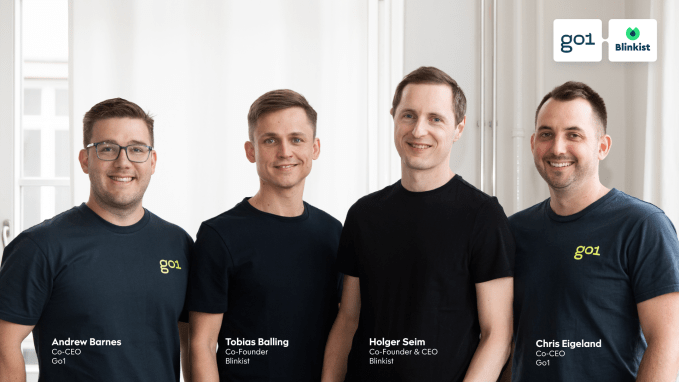After raising $100 million at a valuation of over $2 billion last year, the Australian edtech startup Go1 is making an acquisition and getting some investment to expand its reach and technology to serve the market of corporate online learning.
First, it is snapping up Blinkist, a startup out of Berlin that had built a platform to discover and read abbreviated versions of longer non-fiction books — “Blinks” that typically take no more than 15 minutes to read or listen to.
Second, while financial terms of the acquisition are not being disclosed by the two companies, we have confirmed other details with Go1’s co-CEO and founder Andrew Barnes: the acquisition is a mix of cash and shares. And it will also involve Blinkist’s biggest investor, Insight Partners, taking an additional $30 million in equity in Go1 at an “upround,” but again with the exact numbers not being discussed.
The two platforms will continue to operate separately, but over time the plan is for more integration and cross-selling between the two, the companies said. It will also be working to bring newer currents in technology to bear on the wider platform, such as the incorporation of more AI into Blinkist’s text-summarization process, and — tapping Blinkist’s app format — providing a wider range of options for delivering courses to Go1 users.
“B2B has been our bread and butter, something Blinkist had just started moving into,” Barnes said in an interview. But on the other hand, he noted that “Blinkist has very high user engagement,” something Go1 wants to improve in its app. “We worked out last year that what we want to do they’d already done, and we’d done what they wanted to do.”
Blinkist has had 25 million downloads of its app and has just under 1 million paying users, including some 1,500 companies. Go1 — which is backed by the likes of Salesforce and Microsoft, but also SoftBank — says that it has 8 million users, with big customers including Delta, Hays, Westpac and energy giant EDF, using its e-learning platform, which provides a curated catalog of training and professional development courses, tens of thousands in all.
Blinkist’s last valuation was $160 million in 2018, when it raised $18.8 million, and the company is “significantly bigger” than it was then, Barnes said.
The reason Blinkist hasn’t gone out for funding again in the last five years is because it hasn’t had to: The company is growing and profitable, and it still has money left in the bank, according to Holger Seim, Blinkist’s CEO and co-founder. It had raised just over $37 million, per PitchBook data, with previous backers in addition to Insight including Headline, Greycroft, IBB and more.
The Berlin startup has had a range of potential acquirers knocking on its door over the years, Seim said in a separate interview. Blinkist’s catalog is a mix of text-based and audio content, making it an interesting asset for tech companies, publishers or media brands that have tried to build out bigger e-book operations, business user strategies or even larger media holdings for both in areas like podcasting.
“But there was never something before Go1 that looked like a great fit,” Seim said.

Blinkist and Go1 are sitting in areas that will be worth watching over the coming years, particularly because of how — or if, if you’re more skeptical — they will be disrupted with advances in areas like AI.
One camp would have you believe that both e-learning and reading (and in particular reading summaries) will be overturned as generative AI grows stronger. Personalization will produce content tailor-made to the specific needs of people, whether that’s in terms of what they need to learn, or want to learn, or have time to learn.
Seim is far from concerned about this, though. “We see generative AI as a big opportunity,” he said. He noted that even before the release of ChatGPT, “you could find a summary of a book by Googling. Key insights have always been a commodity.”
But there is still something missing in those takes, he continued. “We’re not a library but a smart companion to make learning part of your life. Content needs to be engaging and entertaining and you need to be recommended the right thing at the right time to keep you going. There is more than the content itself.”
AI is already being used by Blinkist to build recommendation algorithms, but in the future, it could aid the startup’s very-human workforce of people who are building summaries, by helping them work faster and at a lower cost. The startup is already piloting elements of this, he said. “We just need to make sure that GPT can work at scale,” adding that this hasn’t been foolproof so far.
Given Blinkist’s status as profitable and growing, this deal is not likely a part of the M&A trend we’ve seen in technology in the last six months or so, where there has been an uptick of smaller deals as a wave of startups have come to the end of their funding runways and found conditions too challenging to raise more money. What it does open up though are questions of what the next step for the bigger Go1 will be.
Backed by SoftBank’s Vision Fund in its halcyon days, the market for funding and exits for later-stage and larger technology companies has been quite tough in the last six months. Barnes said that an IPO was part of the long-term plan but that “it’s not something we are targeting right now.”
Updated to remove investor names from Blinkist that were not associated with the co at sale.































Comment